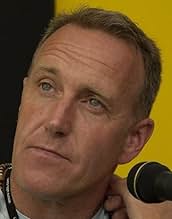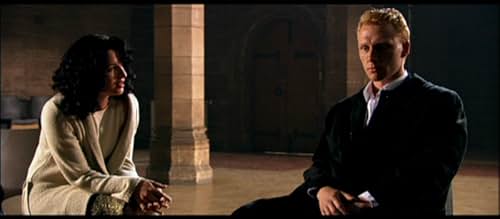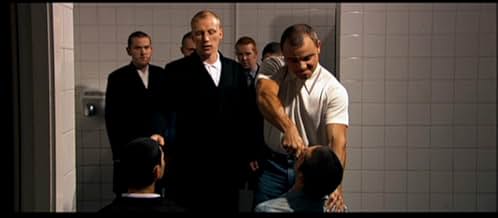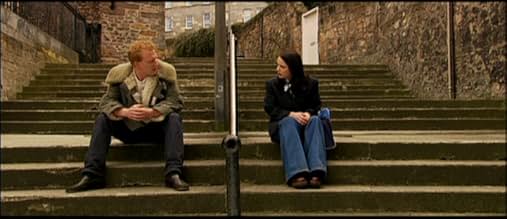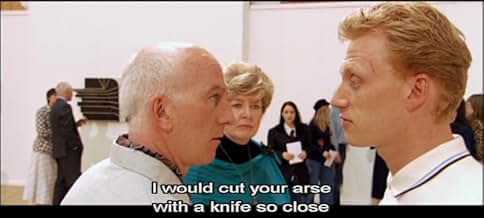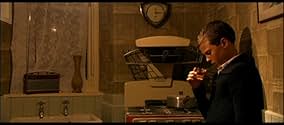IMDb रेटिंग
6.2/10
1.8 हज़ार
आपकी रेटिंग
अपनी भाषा में प्लॉट जोड़ें16 years of alcohol is about a skinhead named Frankie; his violent childhood, alcoholism and his love for Ska.16 years of alcohol is about a skinhead named Frankie; his violent childhood, alcoholism and his love for Ska.16 years of alcohol is about a skinhead named Frankie; his violent childhood, alcoholism and his love for Ska.
- पुरस्कार
- 4 जीत और कुल 9 नामांकन
Iain De Caestecker
- Frankie - Boy
- (as Iain De Caestaecker)
Lewis Macleod
- Frankie's Father
- (as Lewis MacLeod)
Noof Ousellam
- Rival Gang Boy 1
- (as Naoufal Ousellam)
फ़ीचर्ड समीक्षाएं
"Sixteen Years of Alcohol" is the Edinburgh story of a guy with a philandering dad who starts to drink at twelve or so, turns into a violent, alcoholic punker, and finally seeks self-reform. Early scenes depict Frankie, the young boy and his father. We then jump forward to the big, muscular Frankie Mack (Kevin McKidd) terrorizing pubs and shops with his three mates like Alex and his dogies in "A Clockwork Orange" but without Alex's archness and glee. Frankie also gets into fights with his own mates and woos Helen (Laura Fraser), who clerks in a record shop.
Eventually the hero, whose brooding voice-overs constantly intrude, loses Helen, though for a while she seems to have tamed him and turned him from Mars into Artemis, bearer of good news -- as she puts it in a game they play on a colonnade perched high up above the town. Frankie gets stabbed and kicked senseless (S.O.P. for the hoodlums of this piece) and winds up in a twelve-step group for alcoholics -- but when he shares at a meeting, he tellingly substitutes for the classic AA declaration, "My name is Frankie, and I AM A VIOLENT MAN." He also joins an acting workshop with Mary (Susan Lynch), his new girl -- or recovery pal: there's no lovemaking or physical affection shown. One shot hints that Frankie's employed in a workshop or factory, but specific detail is lacking: the film is deliberately short on connected narrative, going for passion and poetry over mundane realism.
There's truth in the 'Village Voice's' thumbnail description of "Sixteen Years of Alcohol" as a series of "static tableaux," and it's also true that McKidd's better than "the dubious romanticism and hard-man clichés of his role." Parts of the movie fall flat, but what makes it worth watching is an intense clarity about the people and the sharply lit scenes they're in. Also welcome to an American is that unlike some Scottish films this one's English is crystal clear too. There is the power and sincerity of the simple small film in "Sixteen Years of Alcohol," but also a lack of narrative focus and sense of a whole world one finds in England's Sixties "angry young man" films beginning with "Saturday Night and Sunday Morning." Jobson isn't trying for "kitchen sink" realism at all, but for something poetic and expressionistic; and the stark, strikingly lit photography helps him approach that goal and make this a watchable film.
What's less appealing is the simplistic fatalism of the plot structure. One may wind up wishing Frankie had received more practical tips about how to stay off alcohol and violence, rather than focusing on his relationships with women, which aren't developed very far anyway. The "dubious romanticism" shows up in the way a life is ultimately seen as circular (as is the film's "ring" framing device) and doomed, rather than -- what would be equally justified by the story -- moderately hopeful. The chap is still young and healthy, after all, and he wants to get better. Why not suggest he's going in that direction? This is the first film for Jobson, previously known as the front man for the Seventies Scottish art punk band, the Skids, and, later as a poet, model, TV presenter, film producer and critic. He has not disgraced himself in this semi-autobiographical effort (the time-line follows that of his own Sixties childhood and Seventies youth). What one remembers are the stark sometimes beautiful images. The high-flown, overwrought writing can be cloying, but may also point in a fresh new direction. No Danny Boyle here, but rather, perhaps, a new style and voice.
(Seen March 26, 2005 at Cinema Village in New York.)
Eventually the hero, whose brooding voice-overs constantly intrude, loses Helen, though for a while she seems to have tamed him and turned him from Mars into Artemis, bearer of good news -- as she puts it in a game they play on a colonnade perched high up above the town. Frankie gets stabbed and kicked senseless (S.O.P. for the hoodlums of this piece) and winds up in a twelve-step group for alcoholics -- but when he shares at a meeting, he tellingly substitutes for the classic AA declaration, "My name is Frankie, and I AM A VIOLENT MAN." He also joins an acting workshop with Mary (Susan Lynch), his new girl -- or recovery pal: there's no lovemaking or physical affection shown. One shot hints that Frankie's employed in a workshop or factory, but specific detail is lacking: the film is deliberately short on connected narrative, going for passion and poetry over mundane realism.
There's truth in the 'Village Voice's' thumbnail description of "Sixteen Years of Alcohol" as a series of "static tableaux," and it's also true that McKidd's better than "the dubious romanticism and hard-man clichés of his role." Parts of the movie fall flat, but what makes it worth watching is an intense clarity about the people and the sharply lit scenes they're in. Also welcome to an American is that unlike some Scottish films this one's English is crystal clear too. There is the power and sincerity of the simple small film in "Sixteen Years of Alcohol," but also a lack of narrative focus and sense of a whole world one finds in England's Sixties "angry young man" films beginning with "Saturday Night and Sunday Morning." Jobson isn't trying for "kitchen sink" realism at all, but for something poetic and expressionistic; and the stark, strikingly lit photography helps him approach that goal and make this a watchable film.
What's less appealing is the simplistic fatalism of the plot structure. One may wind up wishing Frankie had received more practical tips about how to stay off alcohol and violence, rather than focusing on his relationships with women, which aren't developed very far anyway. The "dubious romanticism" shows up in the way a life is ultimately seen as circular (as is the film's "ring" framing device) and doomed, rather than -- what would be equally justified by the story -- moderately hopeful. The chap is still young and healthy, after all, and he wants to get better. Why not suggest he's going in that direction? This is the first film for Jobson, previously known as the front man for the Seventies Scottish art punk band, the Skids, and, later as a poet, model, TV presenter, film producer and critic. He has not disgraced himself in this semi-autobiographical effort (the time-line follows that of his own Sixties childhood and Seventies youth). What one remembers are the stark sometimes beautiful images. The high-flown, overwrought writing can be cloying, but may also point in a fresh new direction. No Danny Boyle here, but rather, perhaps, a new style and voice.
(Seen March 26, 2005 at Cinema Village in New York.)
Films about alcohol are usually depressing. They rob all the enthusiasm for life one might have in just a few hours and leave you staring into the void at the end, wondering what the point was. It's difficult to catalog them in any way, because a good "alcoholics movie" is one which swiftly flows along certain psychological retinues and steadily builds up to a mammoth of self deprivation.
However, this isn't truly a film about alcohol. It's more a film about getting a life (yes, Trainspotting), portrayed in a less imaginative way. It all gravitates around love and the end is helplessly tragic, but "Sixteen Years of Alcohol" isn't that bad. Some sweet imagery and photography might make it worth your time. Also, the story resides within the soul of everyone who suffers due to lack of purpose, not only those subdued to the magic liquor. It's a borderline movie: you may very well dislike it, because the storyline is crap. Like all those films which fit into this part of the movie-specter, "Sixteen..." has good and bad parts. Just to name one, I want to recall the "Clockwork Orange" scenes, which are a homage-like rip-off, that barely prove a point. Moreover, those scenes feel terribly frustrating.
All in all, it's not too bad and it could hardly have been better. No one need to watch it, but everyone is invited. Check out the party. 6/10
However, this isn't truly a film about alcohol. It's more a film about getting a life (yes, Trainspotting), portrayed in a less imaginative way. It all gravitates around love and the end is helplessly tragic, but "Sixteen Years of Alcohol" isn't that bad. Some sweet imagery and photography might make it worth your time. Also, the story resides within the soul of everyone who suffers due to lack of purpose, not only those subdued to the magic liquor. It's a borderline movie: you may very well dislike it, because the storyline is crap. Like all those films which fit into this part of the movie-specter, "Sixteen..." has good and bad parts. Just to name one, I want to recall the "Clockwork Orange" scenes, which are a homage-like rip-off, that barely prove a point. Moreover, those scenes feel terribly frustrating.
All in all, it's not too bad and it could hardly have been better. No one need to watch it, but everyone is invited. Check out the party. 6/10
One can't say that Scottish films about the 70s come to often, but this is one time too many. Kevin McKidd does the Edinburghian skinhead, who can't fight his past (or maybe that is what he actually does, beating people up). The past is a father who cheats on his mother and the son who never really get involved, never takes part in anything.
He is somewhat rehabilitated, or is he really? There is an intellectual narrator voice here in contrast to the violent acting of McKidd. Everything becomes too obvious, but that doesn't make things easier to understand.
A failure and only halfway interesting.
He is somewhat rehabilitated, or is he really? There is an intellectual narrator voice here in contrast to the violent acting of McKidd. Everything becomes too obvious, but that doesn't make things easier to understand.
A failure and only halfway interesting.
I was not expecting much from '16 Years of Alcohol'. Perhaps an overly sentimental look back at Scottish urban life, perhaps a neo-realist bleakness. But when it started with hypnotically beautiful images of Edinburgh and a voice-over in that recognisable cadence, with repeating cycles of words drawing out every ounce of meaning from clichés like "hope"... well, I knew that I was firmly in Richard Jobson territory, and that maybe he has always been a film-maker at heart. He skirts cliché while playing with it, trying to show the violence endemic in that society and making many references to other films ('Clockwork Orange', westerns, 'Trainspotting', Martin Scorsese, etc.). It is larger than life and demonstrates how the mythic archetypes shape the characters rather too small for the roles they want to adopt.
Kevin McKidd is brilliant as "Frankie", a character the amalgam of Jobson and his brother; I kept forgetting he was not in fact Jobson. The women are incredibly beautiful and yet have a depth of character not commonly seen in films that make women into such visual feasts. They are saviour archetypes but again somehow avoid cliché. How is Jobson doing this? There is some subtle artistry at work here. The cinematography is gorgeous and I was glad for the snippet of Skids on the soundtrack, though 'Love is the Drug' gets the best treatment in a scene that is both scary and hilarious.
The film is dedicated to Jobson's brother, who did not escape the life of alcohol and violence and was murdered a couple of years ago. In the post-film talk at the Dublin Film Festival, Jobson revealed he had in fact run with the most notoriously violent of Edinburgh's youth gangs, until Skids took him away from that. This is quite obviously a very personal film and yet a highly aestheticised interpretation as well.
I did not want the film to end, and would gladly have sat through it a second time immediately. Maybe it's just where I'm at in my life right now. Maybe it's because I have spent so many hours over the years infiltrated by Jobson's aesthetic. Maybe it's just a damned good film.
'16 Years of Alcohol' won Richard Jobson the award for Directorial Debut at the British Independent Film Awards. It has received glowing reviews from Time Out, The Guardian, and Sight and Sound. It has played at festivals the world over. Forget the dismal comments of those too cynical to enjoy real film-making. See this poetic triumph for yourself.
Kevin McKidd is brilliant as "Frankie", a character the amalgam of Jobson and his brother; I kept forgetting he was not in fact Jobson. The women are incredibly beautiful and yet have a depth of character not commonly seen in films that make women into such visual feasts. They are saviour archetypes but again somehow avoid cliché. How is Jobson doing this? There is some subtle artistry at work here. The cinematography is gorgeous and I was glad for the snippet of Skids on the soundtrack, though 'Love is the Drug' gets the best treatment in a scene that is both scary and hilarious.
The film is dedicated to Jobson's brother, who did not escape the life of alcohol and violence and was murdered a couple of years ago. In the post-film talk at the Dublin Film Festival, Jobson revealed he had in fact run with the most notoriously violent of Edinburgh's youth gangs, until Skids took him away from that. This is quite obviously a very personal film and yet a highly aestheticised interpretation as well.
I did not want the film to end, and would gladly have sat through it a second time immediately. Maybe it's just where I'm at in my life right now. Maybe it's because I have spent so many hours over the years infiltrated by Jobson's aesthetic. Maybe it's just a damned good film.
'16 Years of Alcohol' won Richard Jobson the award for Directorial Debut at the British Independent Film Awards. It has received glowing reviews from Time Out, The Guardian, and Sight and Sound. It has played at festivals the world over. Forget the dismal comments of those too cynical to enjoy real film-making. See this poetic triumph for yourself.
I'm not a huge film buff but I went to see a screening of this film at the GFT in Glasgow on Monday and Richard Jobson was giving a Q & A afterwards.
Thought his answers to the audience were good and definitely helped make sense of the film a bit much. He made some really good points about the types of films coming out of Scotland these days and how he was trying to get away from that drab reality style we're used to seeing.
it's worth seeing anyway, I wouldn't write it off straight away.
Thought his answers to the audience were good and definitely helped make sense of the film a bit much. He made some really good points about the types of films coming out of Scotland these days and how he was trying to get away from that drab reality style we're used to seeing.
it's worth seeing anyway, I wouldn't write it off straight away.
क्या आपको पता है
- कनेक्शनReferences Enter the Dragon (1973)
टॉप पसंद
रेटिंग देने के लिए साइन-इन करें और वैयक्तिकृत सुझावों के लिए वॉचलिस्ट करें
- How long is 16 Years of Alcohol?Alexa द्वारा संचालित
विवरण
बॉक्स ऑफ़िस
- US और कनाडा में सकल
- $8,046
- US और कनाडा में पहले सप्ताह में कुल कमाई
- $2,863
- 20 मार्च 2005
- दुनिया भर में सकल
- $8,046
- चलने की अवधि
- 1 घं 42 मि(102 min)
- रंग
- ध्वनि मिश्रण
- पक्ष अनुपात
- 2.35 : 1
इस पेज में योगदान दें
किसी बदलाव का सुझाव दें या अनुपलब्ध कॉन्टेंट जोड़ें


